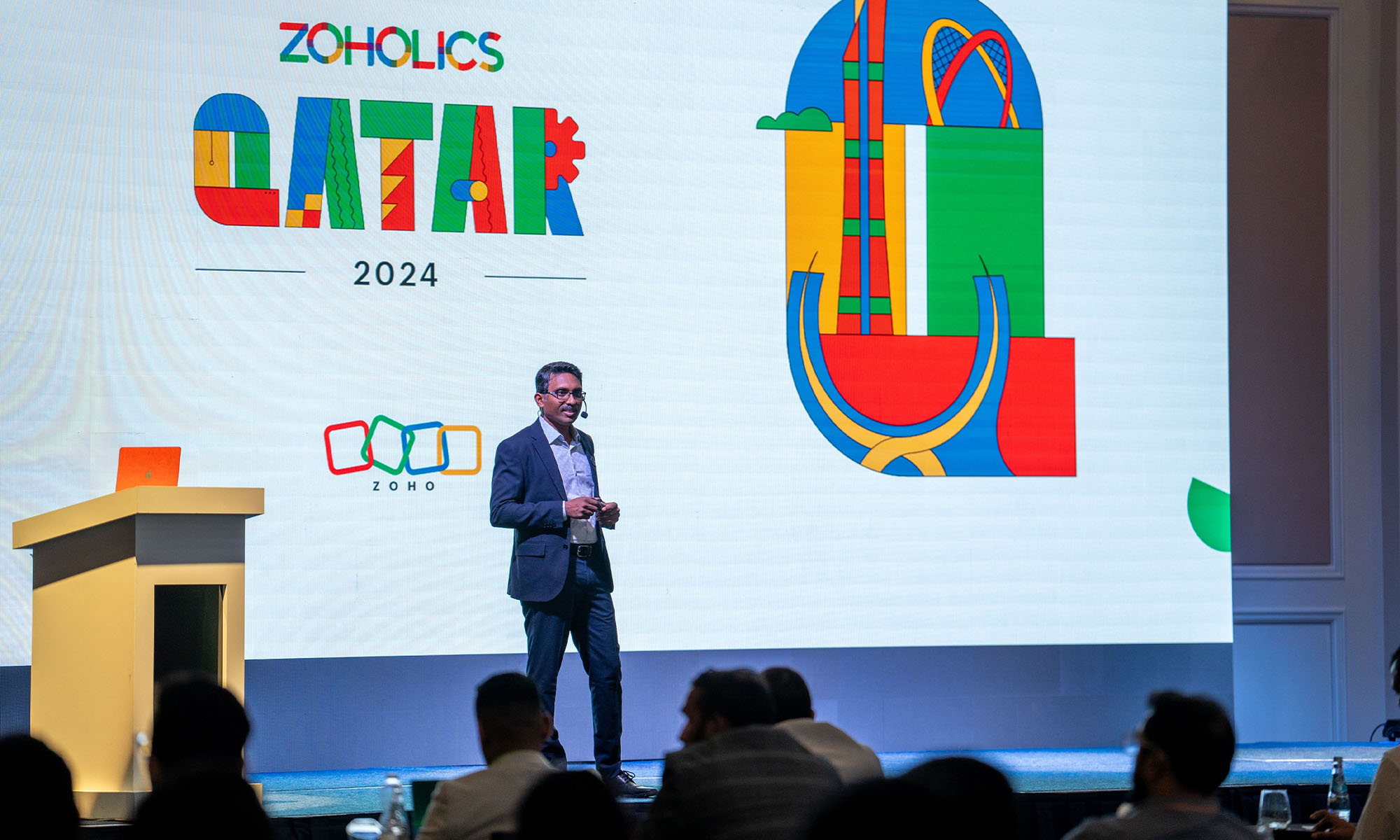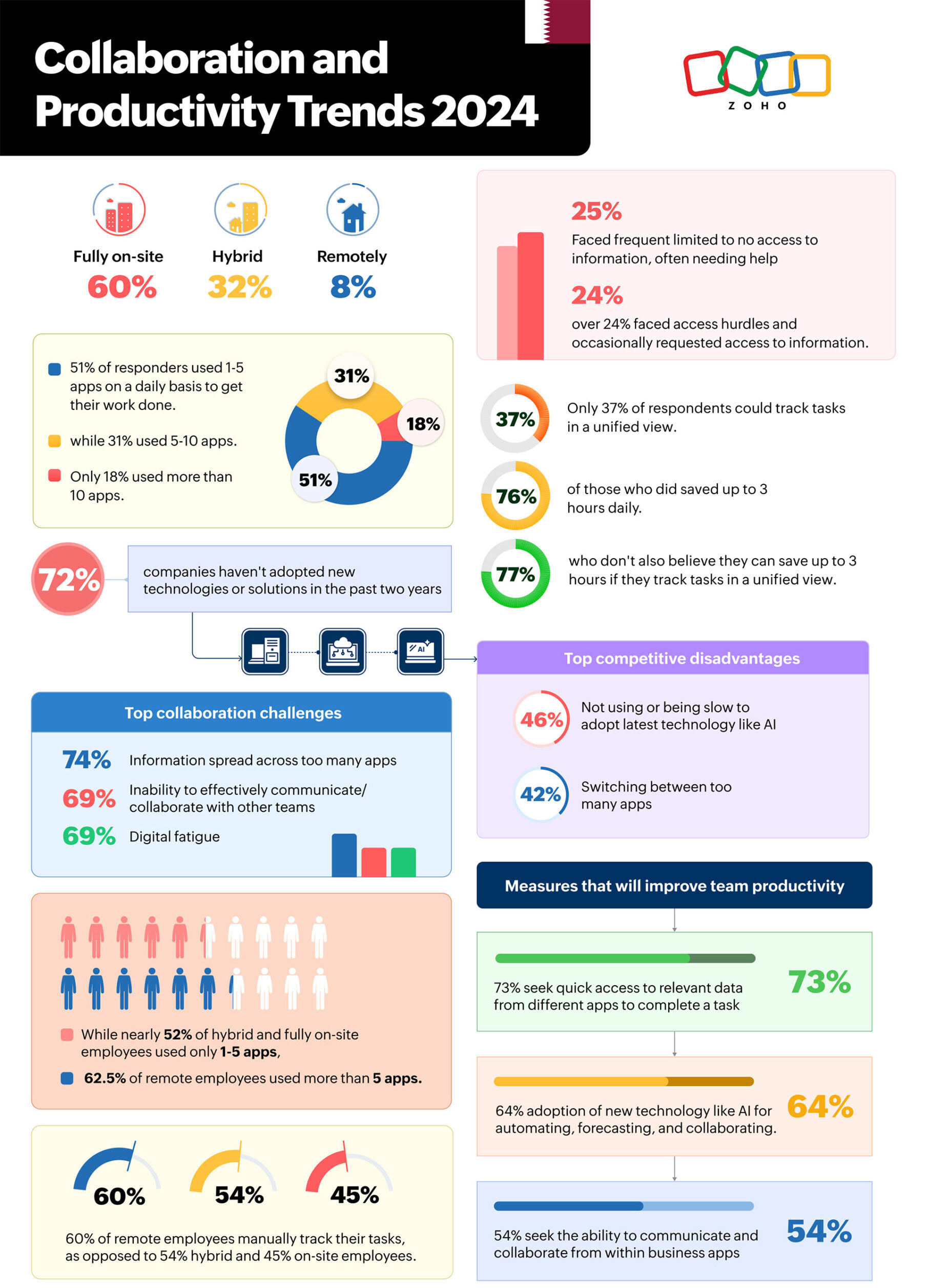News
Zoho Expands Qatar Operations & Releases New Survey Data
The productivity platform has seen strong regional growth and increased demand for its cloud-based solutions.

Productivity and collaboration platform Zoho has announced the opening of its first office in Doha, Qatar, following significant regional growth. The company experienced a 29% increase in revenue while expanding its partner network by 50% in 2023.
Zoho’s remarkable growth in Qatar underscores the rising demand for its cloud-based business applications. The firm’s new office and strategic expansion should enable it to offer more tailored services while strengthening customer relationships.
Hyther Nizam, President of Zoho for the Middle East and Africa (MEA) stated: “We are excited about our continued success in Qatar […] The dynamic business landscape and progressive approach to digital transformation provide an ideal environment for our expansion. We are committed to supporting the country’s journey towards digitalization by offering cutting-edge solutions that cater to the evolving needs of businesses and contribute to national economic growth”.
Productivity & Collaboration Trends In Qatar
The announcement of a new local office was accompanied by news of a Zoho productivity and collaboration survey that revealed important insights into the challenges and opportunities faced by businesses in Qatar, as well as local productivity and collaboration trends.

Also Read: Google’s New AI Technology May Revolutionize Cancer Treatment
Here are some of the key findings:
- Despite the shift towards hybrid and remote work post-pandemic, 60% of Qatari businesses have fully returned to on-site work, while 32% have adopted a hybrid model. Only 8% of respondents work fully remotely.
- The use of digital tools was widespread, with 51% of respondents using 1-5 apps daily, 31% using 5-10, and 18% using more than 10 apps.
- Unified task tracking was shown to save time, with 76% of those using it reporting savings of up to three hours. However, 77% of those manually tracking tasks or not tracking at all also noted potential time savings with a unified system.
- Access to information remains a challenge, with 25% of respondents reporting limited or no access, and 24% needing occasional help finding information.
- The survey highlighted a lag in technology adoption, with 72% of companies reporting no significant changes in the last two years, despite the competitive advantages of AI and automated workflows.
- Remote workers were more likely to adopt new technology and use a broader range of apps, but they struggled with data access. In contrast, hybrid and on-site workers expressed a greater need for improved collaboration tools and communication.
News
Rabbit Expands Hyperlocal Delivery Service In Saudi Arabia
The e-commerce startup is aiming to tap into the Kingdom’s underdeveloped e-grocery sector with a tech-first, locally rooted strategy.

Rabbit, an Egyptian-born hyperlocal e-commerce startup, is expanding into the Saudi Arabian market, setting its sights on delivering 20 million items across major cities by 2026.
The company, founded in 2021, is already operational in the Kingdom, with its regional headquarters now open in Riyadh and an established network of strategically located fulfillment centers — commonly known as “dark stores” — across the capital.
The timing is strategic: Saudi Arabia’s online grocery transactions currently sit at 1.3%, notably behind the UAE (5.3%) and the United States (4.8%). With the Kingdom’s food and grocery market estimated at $60 billion, even a modest increase in online adoption could create a multi-billion-dollar opportunity.
Rabbit also sees a clear alignment between its business goals and Saudi Arabia’s Vision 2030, which aims to boost retail sector innovation, support small and medium-sized enterprises, attract foreign investment, and develop a robust digital economy.
The company’s e-commerce model is based on speed and efficiency. Delivery of anything from groceries and snacks to cosmetics and household staples is promised in 20 minutes or less, facilitated by a tightly optimized logistics system — a crucial component in a sector where profit margins and delivery expectations are razor-thin.
Despite the challenges, Rabbit has already found its stride in Egypt. In just over three years, the app has been used by 1.4 million customers to deliver more than 40 million items. Revenue has surged, growing more than eightfold in the past two years alone.
Also Read: Top E-Commerce Websites In The Middle East In 2025
CEO and Co-Founder Ahmad Yousry commented: “We are delighted to announce Rabbit’s expansion into the Kingdom. We pride ourselves on being a hyperlocal company, bringing our bleeding-edge tech and experience to transform the grocery shopping experience for Saudi households, and delivering the best products – especially local favorites, in just 20 minutes”.
The company’s growth strategy avoids the pitfalls of over-reliance on aggressive discounting. Instead, Rabbit leans on operational efficiency, customer retention, and smart scaling. The approach is paying off, having already attracted major investment from the likes of Lorax Capital Partners, Global Ventures, Raed Ventures, and Beltone Venture Capital, alongside earlier investors such as Global Founders Capital, Goodwater Capital, and Hub71.

























